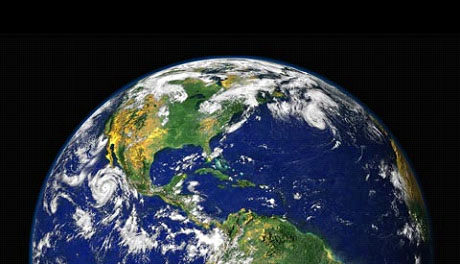|
|
『环境学家警告人类环境问题将导致人类世界末日的声音不绝于耳,但与此同时,人们的生活却在不断的向前进步,究竟有没有所谓的“世界末日”?而又是什么让人们能在如此恶劣的环境中,暂且美好的生活着?』
If the world is going to hell, why are humans doing so well?
世界末日 vs. 美好生活
Sep 1st,2010 | from Scientific American

For decades, apocalyptic environmentalists (and others) have warned of humanity’s imminent doom, largely as a result of our unsustainable use of and impact upon the natural systems of the planet. After all, the most recent comprehensive assessment of so-called ecosystem services—benefits provided for free by the natural world, such as clean water and air—found that 60 percent of them are declining.
Yet, at the exact same time, humanity has never been better. Our numbers continue to swell, life expectancy is on the rise, child mortality is declining, and the rising tide of economic growth is lifting most boats.
So which is it? Are these the best of times or the worst of times? Or both? And how imminent is our doom really? In the September issue of BioScience, a group of scientists attempts to reconcile the conflict and answer the question: "How is it that human well-being continues to improve as ecosystem services decline?"
The authors, led by geographer Ciara Raudsepp-Hearne of McGill University, offer four hypotheses for this "environmentalist’s paradox": humans are actually worse off than we think; the ability to grow food trumps all other ecosystem services as far as humans are concerned; technology has allowed us to transcend the environment; and the ill effects of environmental degradation lag its benefits, i.e. the worst is yet to come.
First off, despite vast differences, on the whole, humanity has never been better. Yes, more people are now displaced by warfare than at any time since World War II, and yes, natural disasters affect more people than ever, but we’re far more prepared to deal with such things and therefore actual deaths as a result of them are going down. Plus, the "human development index"—an aggregate measure of life expectancy, literacy, educational attainment and per capita gross domestic product beloved by economists and wonks—has never been higher. "Human well-being is, on average, growing," the authors write. So that hypothesis is right out.
As for farming, it’s pretty clear that it’s one of (if not the) most important ecosystem services humanity requires. That’s certainly one lesson of the "Green Revolution" that averted the famines many apocalyptic environmentalists forecast in the 1970s. At the same time, farming drives much of the ecological damage humans do: from habitat loss (and decreasing biodiversity) to messing around with the cycle of nitrogen through the environment. So while there are costs associated with the loss of other ecosystem services—an example on my mind this anniversary week is the loss of wetlands that helped doom New Orleans to the ravages of Hurricane Katrina—our continued success at farming trumps them.
And we are getting better at it, growing more crops on less land—a key technological innovation. The technological innovation of burning fossil fuels—liberating the energy stored by eons of life on Earth—is also at the root of present human well-being. At the same time, however, these new technologies hardly free humanity from, for example, the need for the fresh water provided by natural systems.
So are we simply storing up trouble for the future, like the rising CO2 levels in the atmosphere that have locked in some amount of global warming for the foreseeable future? Yes and no—climate change is a certainty, whether all of human society is headed for collapse is not. As the researchers put it: "While there are many important time lags in Earth’s systems…the consequences of those lags for human well-being are unclear."
That’s not exactly comforting, nor is the fact that we cannot assume that the past is prologue to the future. The potential for unexpected and sudden crises always looms, like the global economic collapse or food crisis in 2008. At the same time, there is the potential for technology to begin helping ecosystem services, rather than hurting them.
That said, one thing is clear: We live in the Anthropocene—an era when everything from the atmosphere to the layers of rock laid down for the future are dominated by human activities. Management is no longer a luxury. We had better get good at it. (684 words)
文章地址: http://blogs.scientificamerican.com/observations/2010/09/01/if-the-world-is-going-to-hell-why-are-humans-doing-so-well/ |
|